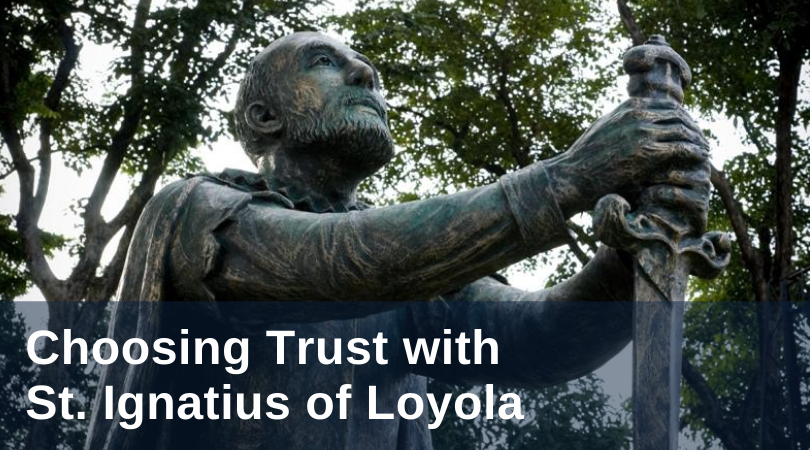
During the isolation of the COVID-19 pandemic, I strive to live with intentionality and creativity. At times, I have found myself struggling with a fear of the unknown that paralyzes me as I try to contemplate the many possibilities for what the future may hold. Ultimately, I trust in God as the One who created me out of love, who sent his Son into the world to die for me and to draw me into the life of the Trinity, and who sent the Holy Spirit to guide me. Yet, in the moments when my wonder turns to fear—about the health of those I love, what the fall semester will look like, or when I might next see and hug my family living out-of-state—I cling to a need for certainty and a desire to control.
In these moments I turn to a practice from St. Ignatius of Loyola, whose feast we celebrate today: the “Contemplation to Attain Love” that concludes his Spiritual Exercises.
In the “First Point” of this practice, I recall all the gifts I have received, pondering “with deep affection how much God our Lord has done for me” and how he “desires to give me even his very self” (Spiritual Exercises [SE], trans. Ganss, §234). Even in the midst of the challenges and suffering of the pandemic, this act of memory evokes a sense of gratitude that is nourished and deepened by savoring the graces of all that I have received from God. Recalling the things I have been given and the ways that God has acted in my life helps ground me in a fundamental disposition of humility before God.
Filled with gratitude for all that God has given, I am invited to “reflect on myself, and consider what I on my part ought in all reason and justice offer and give to the Divine Majesty, namely all my possessions, and myself along with them” (SE, §234). In these moments, I remind myself of the desire to surrender fully, to continue to grow in the interior freedom that lies at the heart of the Spiritual Exercises.
Throughout the pandemic, I have been particularly attentive to the ways in which I grasp for control or cling to a desire for certainty that is impossible to attain. Surrendering to God is not passive. Instead, I make an active choice to trust in God rather than succumb to my anxiety and fear.
I consider all that I am—my gifts, challenges, strengths, brokenness, hopes, and fears—and “I will speak as one making an offering with deep affection, and say,” in the words of St. Ignatius, a prayer known as the Suscipe:
Take, Lord, and receive all my liberty,
my memory, my understanding, and all my will—
all that I have and possess.
You, Lord, have given all that to me.
I now give it back to you, O Lord.
All of it is yours.
Dispose of it according to your will.
Give me love of yourself along with your grace,
for that is enough for me. (SE, §234)
Praying through these movements invites me to a deeper authenticity and vulnerability with God. Past grace is a promise of future grace. Thus, God’s faithfulness throughout the ages will be born anew in my own life at each stage of my journey.
Perhaps, like me, you also struggle with doubt, worry, or anxiety. In those moments I invite you to consider making this prayer your own as a way of practicing the choice to trust in God in the face of anxiety.
Express your desire to surrender to God:
Take, Lord, and receive . . .
Name the gifts you offer back to the Giver:
All my . . .
Ask for what you really need:
I ask only for . . .
Following the example of St. Ignatius and making the concrete choice to say the words of this prayer—to recognize all we have been given and offer it back in love to the Giver—deepens our trust in God as we choose trust in the face of doubt, hope in the face of fear, joy in the face of despair.
Like what you read? Submit your email below to have our newest blogs delivered directly to your inbox each week.
Featured image by Cocoy Lopez; CC-BY-NC-ND-2.0.


